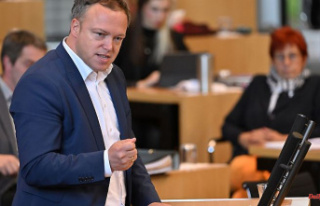Not only tenants are struggling with the sharp rise in prices - the housing industry itself also sees itself facing major problems. A large association complains that there is currently hardly any money left for the urgently needed new housing construction.
Düsseldorf (dpa/lnw) - Due to the sharp rise in energy and building material prices, the socially oriented housing industry in NRW currently sees hardly any opportunities for new construction projects. The energy and construction price crisis is bringing residential construction to a standstill, complained the director of the Rhineland-Westphalia Association of Housing and Real Estate Management (VdW), Alexander Rychter, on Tuesday in Düsseldorf. "Increased construction prices, interest rate hikes, delivery bottlenecks, a shortage of skilled workers and now the sharp rise in energy prices: At the moment it is basically impossible to reliably plan new housing construction and energy-related modernization," he said.
New residential construction in North Rhine-Westphalia has become more expensive than it has been since 1970. The construction price index for residential buildings rose by 16.1 percent between May 2021 and May 2022. Building materials in particular have become more expensive. Reinforcing steel, for example, has become 72 percent more expensive in this period.
The 475 member companies and cooperatives manage around 1.1 million apartments in North Rhine-Westphalia. Of these, more than 600,000 apartments would be heated via central gas heating. The companies have to make advance payments to the gas suppliers before the costs can be passed on to the tenants in the form of ancillary costs. This would tie up funds that were actually planned for new construction and modernization projects.
"We assume that the advance payment for our members in North Rhine-Westphalia will be up to 2.28 billion euros higher this year than in 2021," says Rychter. This corresponds almost exactly to the amount that members would have invested in modernizing and maintaining their portfolio in 2021. Almost eleven percent of the VdW companies would even have to take out loans in order to be able to cope with the advance payments.












